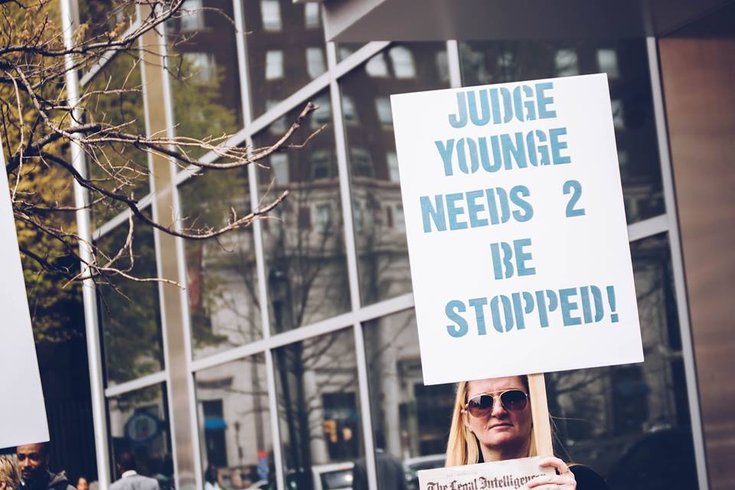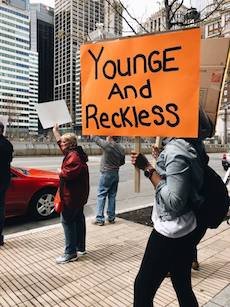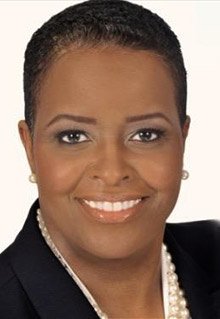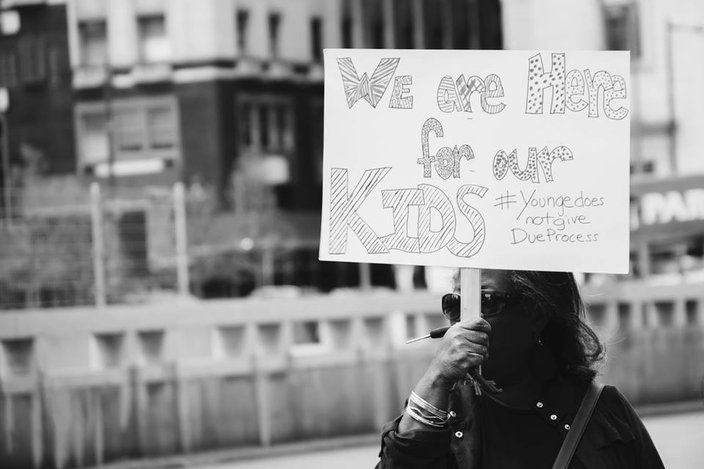
July 02, 2018
 Photo courtesy/s. badiyah austin
Photo courtesy/s. badiyah austin
A group of parents, grandparents and supporters have been protesting for a Family Court judge to be removed from the bench after allegations of due process violations surfaced this year.
In November 2015, Lyris F. Younge was elected to serve as a Philadelphia Court of Common Pleas judge. Two weeks ago – just two years and seven months later – the president judge of that court petitioned for Younge to be permanently reassigned from the Family Court bench on which she’d served.
There, her controversial – albeit short – tenure reportedly devastated Philadelphia families, mystified and infuriated attorneys, and called into question the virtue of electing judges in the city.
“Your petitioner deems this reassignment necessary and in the interest of the effective administration of the business of the Court,” wrote Sheila Woods-Skipper, president judge of Common Pleas court in a June 11 petition to the state Supreme Court.
Court officials said they’re letting that line in the petition serve as their comment on the matter. But it doesn’t come close to describing the astonishing totality of what people say they faced in Younge’s courtroom.
Parents claimed their children were taken away from them before they even had the opportunity to address Younge's court or present evidence to answer claims being made against them.
Family Court operates in a fashion somewhat shielded from the public eye. That’s guided by the sense that issues involving children should face a lower level of public attention than those facing adults at the Criminal Justice Center.
As a result, it took more than a dozen people who’d seen their children taken away from them to speak up – and diligent investigative reporting by the Legal Intelligencer’s P.J. D’Annunzio – to draw attention to a situation that, if the claims are true, brings a different version of the family-separation issue home to Philadelphia.
Samuel Stretton, the attorney representing Younge, did not return a call seeking comment for this story last week.
In the wake of the decision to transfer his client to the court's Trial Division though, he told the Philadelphia Tribune that "I believe she is being unfairly accused. She is a fair judge and I don't know why they are going after her."
Several people on the other side of the issue, however, told PhillyVoice this week that they see the move as a saving grace.
Two of them are parents who saw their children taken away from them under questionable circumstances.
The third is a longtime Philadelphia attorney who witnessed firsthand how Younge operated during a case involving his daughter and son-in-law.
It’s their chance to push back against a judge who they say acted more like a tyrant than a fair-minded jurist charged with oversight of Philadelphia families in the legal system for a variety of reasons.
Their reversal of fortunes, one that they didn't think would ever come, started fewer than three months ago.
“Phila. Family Court Judge Has A History of Violating Parents’ Rights” read the headline of an April 2 story in the Legal Intelligencer.
It shared the story of a parent, identified solely as E.C.G. in court records, who ran to the bathroom during proceedings on March 16, 2016 because she “was too sick to her stomach to stay in the courtroom where her child’s future would be decided.”
The protesters have gone to Family Court with their message.
“I’m not allowing her to come back in,” Younge was quoted as having said. “So that testimony is out the window because she walked out without permission of the court. Even if she was sick, she should have had the courtesy to let me know that. So her disdain for the court has been so noted.”
That move drew a rebuke from an appeals court panel warning Younge to be “faithful to the law,” which having “precluded (the mother) from the opportunity to be heard” was not.
The Intelligencer story – based on interviews with parents who sought anonymity “for fear of retaliation from Younge” and a review of legal documents – reported “a record of violating parents’ rights during her short time on the bench.”
It also found that decisions made by Younge – who received a “not recommended” rating from the Philadelphia Bar Association prior to the election – faced “more active appeals … (and) more rulings fully or partially overturned on appeal” than her peers.
In the two years starting in March 2016, there were 77 active appeals of Younge’s decisions, or 11 less than the next two highest judges combined, according to the Intelligencer, to which a longtime child advocate described the judge as “off the rails” and “uncontrollable.”
Among the other cases detailed in that story was that of Miltreda Kress, a 38-year-old mother of four from Mayfair who has an active case before the judge. She detailed a November 28 hearing in which she was allegedly warned by the judge not to speak. (There will be more from Kress, who detailed the resulting damage to her family, later in this story.)
One “veteran family lawyer who practices before Younge” was quoted in the piece.
“She has these days where she takes the cases extremely personally, she takes any objections personally. She’s made up her mind pretty much in the first 30 seconds of the case," the attorney claimed. "She has the capacity to be a good judge, but she has these bad days where she takes it out on the families.”
D’Annunzio's story opened the proverbial floodgates, prompting parents who’d faced similar situations in Younge’s courtroom to find one another and share their stories.
Younge would soon be pulled from the contempt case against an attorney she’d never given the chance to defend himself.
Previously an attorney in the City of Philadelphia’s Law Department for more then a decade, Younge earned a bachelor's degree in English from Emory University in 1988 and a Juris Doctor degree from the University of Georgia School of Law in 1990,
In the weeks since – emboldened by a sense of security against retribution – those parents, grandparents and supporters have protested outside Family Court and outside a television station in Old City, where they chanted “give us back our kids.”
In May, an appeals court ripped Younge for doing “everything in her power” to take an infant away from her parents and placing her in foster care, instead of with her grandmother, in an attempt to make the parents confess to alleged abuse.
"The articles and conclusions set forth are incorrect.” – Samuel Stretton, attorney for Judge Lyris Younge, to the Philadelphia Tribune
The punishment, per the appeals court, “was, at best, neglectful and, at worst, designed to affect the bond between parents and (child) so that termination (of familial custody) would be the natural outcome of the proceedings.”
It represented the ninth time that one of Younge’s decisions was overturned on appeal, according to the Intelligencer's investigation.
That same month, the state Judicial Conduct Board launched a probe into the judge’s track record of alleged due-process violations.
Stretton, the attorney hired by Younge, told the Intelligencer that the investigation was sparked by the coverage and subsequent publicity.
He said he was providing the board with information “to demonstrate that the articles and conclusions set forth are incorrect.”
He also maintained that his client is doing “an incredible job with an extremely difficult caseload,” and rued the lack of support coming from the court’s administration.
Later in May, Younge would be “absent” from the bench – whether it was because she was “catching up on an administrative backlog,” on vacation or sidelined remains unclear – and another judge brought in to address her cases would arrive.
Judge Lyris F. Younge
That judge would immediately start overturning many of her decisions, thus reuniting families that had been torn apart.
With Younge officially transferred from the Family Court bench, families are more willing to talk freely about what they experienced as they push for the judge to be removed from office entirely.
The title of the petition on Change.org bluntly explains its intention “to remove Judge Lyris F. Younge from office.”
It alleges that she is “well known for her history of violating parents rights” and “creating Judicial parental alienation.”
“Hundreds of families have been affected due to Younge’s unsupported decisions. … Lyris Younge has made it her goal to separate families, terminate parental rights, and adopt their children out,” contends the petition, which cites several quotes critical of Younge from Superior Court judges who have overturned her decisions in the past.
The petition was started last month by Lisa Mothee, an Olney woman who was in the system attempting to regain custody of five children ranging in age from 10 months to nine years old.
When she went to Family Court last September, she was confident that the evidence she brought with her would help get the case closed.
According to Mothee, the case started when she took a single Percocet in the last days of her most-recent pregnancy and the baby tested positive for opiates. The hospital called the Department of Human Services (DHS), and her family’s nightmare began.
"I remember walking out in cuffs, passing out, getting strip-searched, being locked up for eight hours and, when I got out, my children were gone." – Lisa Mothee, Olney mother
She brought medical records for herself and her children to court that day to prove she was in compliance.
“I thought there was a fair chance the case would be closed that day,” the 31-year-old mother told PhillyVoice on Wednesday. “That’s was not what happened.”
The first indication that things might go wrong? Her court-appointed attorney telling Mothee that Younge "takes people’s kids away.”
The second? When she spoke after Younge told her not to “blurt out in court,” she was taken into custody, and her four older children were picked up from the babysitter and taken into protective custody.
“It all happened so fast,” said Mothee, who identifies by a different name on her mobile phone voicemail because she said she’d been harassed because of this whole mess. “I remember walking out in cuffs, passing out, getting strip-searched, being locked up for eight hours and, when I got out, my children were gone.”
Her life then became focused on getting her kids back. After she fired the court-appointed attorney, she hired another who warned her about Younge’s reputation, saying that “she’s not going to look at what we have to say.”
Mothee planned to speak out publicly, but was warned not to out of fear for retaliation. She should just be happy that her children were placed with relatives, Mothee was told. That wasn't always the case.
Over the past six months, Younge’s behavior on the bench has become Mothee’s obsession. The mother estimates that she's connected with 30 different families who make similar claims. She found them by going to Family Court or drug-and-alcohol and parenting classes and asking around.
She also reached out to the Intelligencer, which she urged to get the court transcripts from these cases.
“That’s how we proved what was going on,” she said. Without the subsequent attention, “I don’t believe that Younge would be being held accountable.”
Still, the fear of retribution left many of those parents unwilling to speak publicly. That’s when Miltreda Kress said enough is enough.
“This whole thing has been a nightmare,” said Kress, a Mayfair mother of three daughters between the ages of (almost) 12 and 16. “I don’t feel it’s just the judge. It’s DHS. The child advocates. They’re all in together.”
Her case, which began last year, started when DHS came to the house with the mindset that her boyfriend was abusive both to her and her girls. To mother and daughters, the case worker’s accusations were unfounded. Last October, they planned to state that for the record in court, but weren't afforded the opportunity.
“Judge Younge wouldn’t hear the case. She told me to file for a stay-away order on my boyfriend without even hearing the case,” Kress claimed, noting that Younge told her in court that day, “ 'Let me tell you right now: If you’re still with your boyfriend when you come back to court, you’ll never get your kids back.’
"She made her decision before the trial ever happened,” Kress said.
To Kress, the caseworker – who no longer works for DHS – bears a lot of responsibility for what’s happened to her family.
Despite no signs of abuse, neglect or substance abuse – as would later be claimed – her father-in-law contends he overheard the caseworker say into a phone, while outside in Kress’ driveway, that “I’m going to go in here and teach these people a lesson.” (That was before the court appearance.)
To this day, her daughters are still not living at home.
One was put in kinship care with her 42-year-old brother, who Kress claimed wasn't fit for that responsibility.
“She stopped me from seeing my kids. There were supervised visits. DHS didn’t like how my kids wouldn’t go against me, saying they were coerced,” Kress shared this week. “My girls aren’t going to lie for you. My boyfriend was a father figure to them.”
Kress said that when her boyfriend said “they’re my kids,” the child advocates took umbrage.
“How come you call them your kids when they’re not your kids?” she recalled of the reaction. “The child advocates took that story, flipped it around and tried to make him out to be a pedophile.”
When the case went to court, the children were not permitted to testify.
“When I tried to speak up, I was immediately shut down,” she said. “It’s all there in the transcripts.”
Dozens of parents protested outside Family Court in an effort to draw attention to the courtroom practices of Judge Lyris Younge.
“Damned if I do, damned if I don’t. So, I was the first parent to go on the record,” she said. “I was scared to death. I had nightmares that the judge had hitmen out chasing me. I’d wake up in a full-blown panic attack. I couldn’t eat. I couldn’t sleep. I had nightmares about my kids getting murdered. I quit my job.
“I knew I had to stand up and fight," she recalled. "From that day on, people started to listen to us.”
In late May, the judge who’s filling in for Younge in Family Court reversed the previous judge’s decision and reunited Mothee with her children.
Kress will have to wait a little longer. She, too, has appeared before Judge Joseph Fernandes, who took her daughters into chambers to get a feel for a case about which he was just getting up to speed.
“My kids told him that they never said the things people said they said. He lifted the stay away order and we have unsupervised visits now,” said Kress, noting that Fernandes didn’t instantly overturn the previous decision.
Instead, he said he wanted Kress to finish the women’s-empowerment classes and therapy before making that final decision.
“If she does that, I don’t see a problem with you going home,” the daughters were told.
"She should be facing criminal charges or disbarred. She stole people’s children away without a fair trial." – Miltreda Kress
That hearing is scheduled for August 14, which can’t come soon enough for Kress, who said her 15-year-old “was neglected and all but attacked” in foster care while her 16-year-old has been attacked in foster care. (She’s currently in a group home where staff members have told her mother that she doesn’t belong.)
Kress is unhappy that Younge merely got transferred and not removed from the bench entirely.
“Honestly, I don’t feel like she should be allowed in any court,” she said. “She’s not fair. She’s not impartial. She should be facing criminal charges or disbarred. She stole people’s children away without a fair trial."
Removing a judge elected to the bench is not an easy proposition in Pennsylvania. Judges can either be impeached by the state House of Representatives and then convicted with a two-thirds vote of the state Senate, or the judicial conduct board presents its case to the court of judicial discipline, which can impose sanctions ranging from reprimand to removal from office.
Kress doesn't seem to be willing to let up with Younge or the system itself.
“Once I’m done getting my kids back, I’m not stopping. I’m exposing DHS. I’m exposing the child advocates. It doesn’t just stop and start with the judge," she said. "It’s bigger.”
For James Binns, the local attorney whose been in touch with these families because his daughter's case was heard before Younge, it's a relief to see "Fernandes starting to undo everything she's done."
Meanwhile, Mothee remains concerned about the long-term impact the situation may have on her children.
“It was pretty traumatic for them. They’ve never been anywhere else but with mommy and daddy,” Mothee said. “Even now, my three-year-old tells me when she wakes up that she misses me.
“It’s hard for them. I can’t explain it to them. It’s a secret that nobody wants to think about. They think if people get their children taken away, that they must have done something wrong.
"Well, that’s not the case.”
 Photo by/s. badiyah austin
Photo by/s. badiyah austin Source/Twitter
Source/Twitter Photo by/s. badiyah austin
Photo by/s. badiyah austin